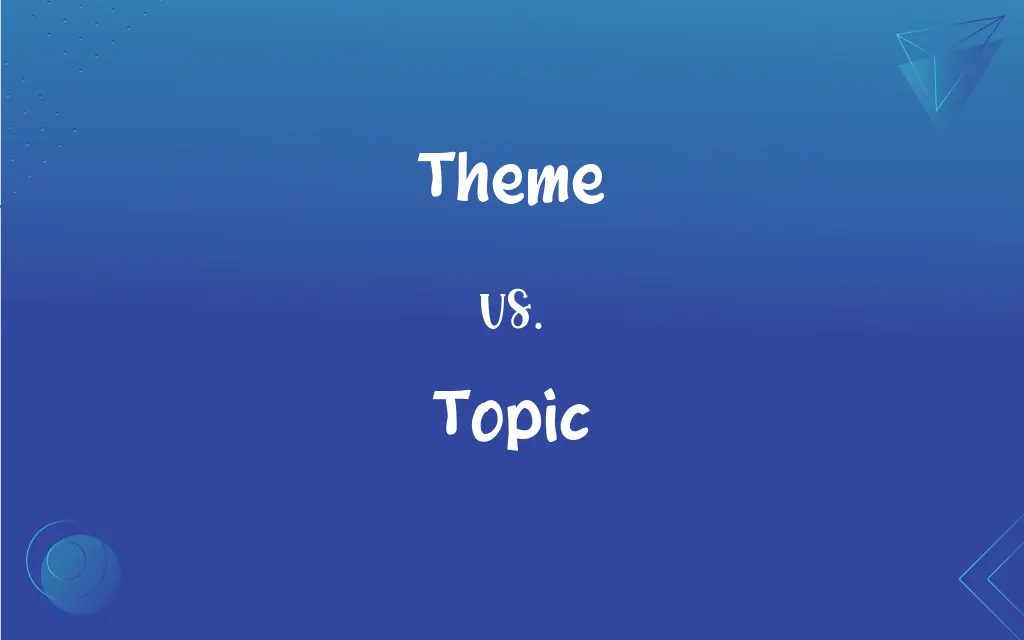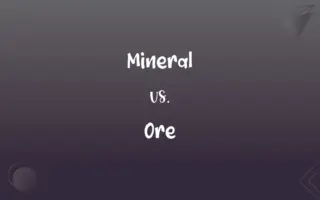Theme vs. Topic: What's the Difference?
Edited by Aimie Carlson || By Harlon Moss || Updated on October 12, 2023
A topic is a subject discussed, while a theme is an underlying message or lesson conveyed in a piece of writing.

Key Differences
A theme and a topic, though often used interchangeably, hold distinct meanings, particularly in the context of written content. The topic generally refers to the subject matter being discussed or described, presenting a focal point around which the narrative or discussion revolves. On the other hand, the theme provides a deeper, underlying message or moral that the author seeks to convey, often subtly woven through the narrative.
In a more tangible sense, a topic typically presents itself quite clearly and is immediately identifiable as the core subject of the text. The theme, however, may require a discerning eye to interpret, as it encompasses the insights, values, or perspectives that unfold gradually through the storyline or discussion. Whereas topics are explicit and straightforward, themes demand exploration and contemplation to be fully grasped.
To illustrate, consider a novel: the topic might be a war, which serves as the overt subject around which events and discussions are centered. Conversely, the theme might delve into the deeper exploration of the futility of war, human suffering, or the enduring human spirit, which unfolds through the characters, plots, and settings. Therefore, while topics lay the groundwork, themes enrich the narrative with depth and meaning.
Applying this to non-fiction or everyday communication, a speaker might choose a topic like “Climate Change,” providing information, facts, and data pertinent to this subject. Simultaneously, the theme might revolve around ethical considerations, highlighting the moral duty of individuals and societies to safeguard the planet for future generations, which might be reflected through various arguments and examples presented.
Ultimately, recognizing the distinction between theme and topic enhances the comprehension and analytical skills necessary for appreciating and creating rich, meaningful text. The topic serves as the visible, tangible subject, while the theme offers an intangible, yet profound, depth that provokes thought, discussion, and introspection.
ADVERTISEMENT
Comparison Chart
Definition
An underlying message or lesson
A subject matter being discussed or written about
In Literature
A universal idea explored throughout a work
Specific matter being discussed within the context
Scope
Generally broader and abstract
Usually more concrete and narrow
Role
Gives depth, linking content to broader ideas
Acts as a focal point, guiding the content creation
Example
Love conquering all in a novel
Discussing climate change in an essay
ADVERTISEMENT
Theme and Topic Definitions
Theme
A musical melody that recurs throughout a composition.
The theme in Beethoven’s Symphony provides a dramatic flair.
Topic
The subject of a conversation or discussion.
Today's topic in the meeting is budget allocation.
Theme
The subject of a piece of writing.
The theme of the essay is the impact of climate change.
Topic
A matter dealt with in text or conversation.
The topic of his speech was artificial intelligence.
Theme
A setting or ambiance created through decorations and aesthetics.
The winter wonderland theme was visible in every aspect of the party decor.
Topic
A specific area of study or interest.
His main topic of research is neural networks.
Theme
A unifying or dominant idea or motif.
The theme of sacrifice permeates the entire novel.
Topic
The focal point or issue being considered.
The main topic of discussion was the upcoming election.
Theme
A distinct, recurring, and unifying quality or idea.
The theme of rebellion is vivid in various historical contexts.
Topic
A heading or label used to categorize information.
Under the topic expenses, she listed all the necessary items.
Theme
A topic of discourse or discussion.
Topic
The subject of a speech, essay, thesis, or discourse.
Theme
A subject of artistic representation.
Topic
A subject of discussion or conversation.
FAQs
Can a theme be a word or phrase?
Yes, themes can often be summarized in a word or phrase like "love," "courage," or "the impact of technology."
How is a theme developed?
A theme is developed through characters, plot, and other narrative elements.
How does a topic differ from a theme?
A topic is the subject matter, while a theme is the underlying message or lesson derived from it.
Is a theme specific to literature?
No, themes can be found in various forms of media, including films, plays, and even musical compositions.
Can a work have more than one theme?
Yes, a work can explore multiple themes simultaneously.
How to create a theme?
Develop a theme by considering what universal messages or concepts you wish to explore through your narrative or content.
Can themes change during the progression of a story?
While a dominant theme typically prevails, secondary themes may evolve or emerge as the story progresses.
Can themes be universal?
Yes, themes often explore universal concepts that can be understood and related to by various audiences.
Is a topic always obvious?
Not always. Some topics may be implicitly expressed and recognized through understanding the content.
Can two writings have the same topic but different themes?
Absolutely, as the topic is the subject matter while the theme represents deeper messages or insights.
Can the topic and theme be related?
Yes, often the topic is the subject matter through which themes are explored.
Can the same topic yield different themes in different contexts?
Yes, the themes derived from a topic can vary based on the perspective and intention of the creator.
Is a topic synonymous with a title?
No, while a title may hint at the topic, it is not always a direct synonym or indicator of it.
Can a topic be broad?
While topics are usually specific, they can be broadened to cater to extensive discussions or explorations.
How do you identify a theme?
Identify themes by considering recurring patterns, symbols, and messages within a work.
How do you choose a topic?
Choose a topic based on interest, relevance, and the availability of resources for exploration.
Can a theme be direct or explicit?
While themes are often implicit, they can occasionally be explicitly stated, especially in moralistic tales.
Are topics always factual?
No, topics can be factual, speculative, or hypothetical in nature.
What is a theme in literature?
A theme is an underlying message, idea, or concept explored throughout a literary work.
Can a topic be a question?
Yes, a topic can be formulated as a question to explore or answer through discussion or writing.
About Author
Written by
Harlon MossHarlon is a seasoned quality moderator and accomplished content writer for Difference Wiki. An alumnus of the prestigious University of California, he earned his degree in Computer Science. Leveraging his academic background, Harlon brings a meticulous and informed perspective to his work, ensuring content accuracy and excellence.
Edited by
Aimie CarlsonAimie Carlson, holding a master's degree in English literature, is a fervent English language enthusiast. She lends her writing talents to Difference Wiki, a prominent website that specializes in comparisons, offering readers insightful analyses that both captivate and inform.































































